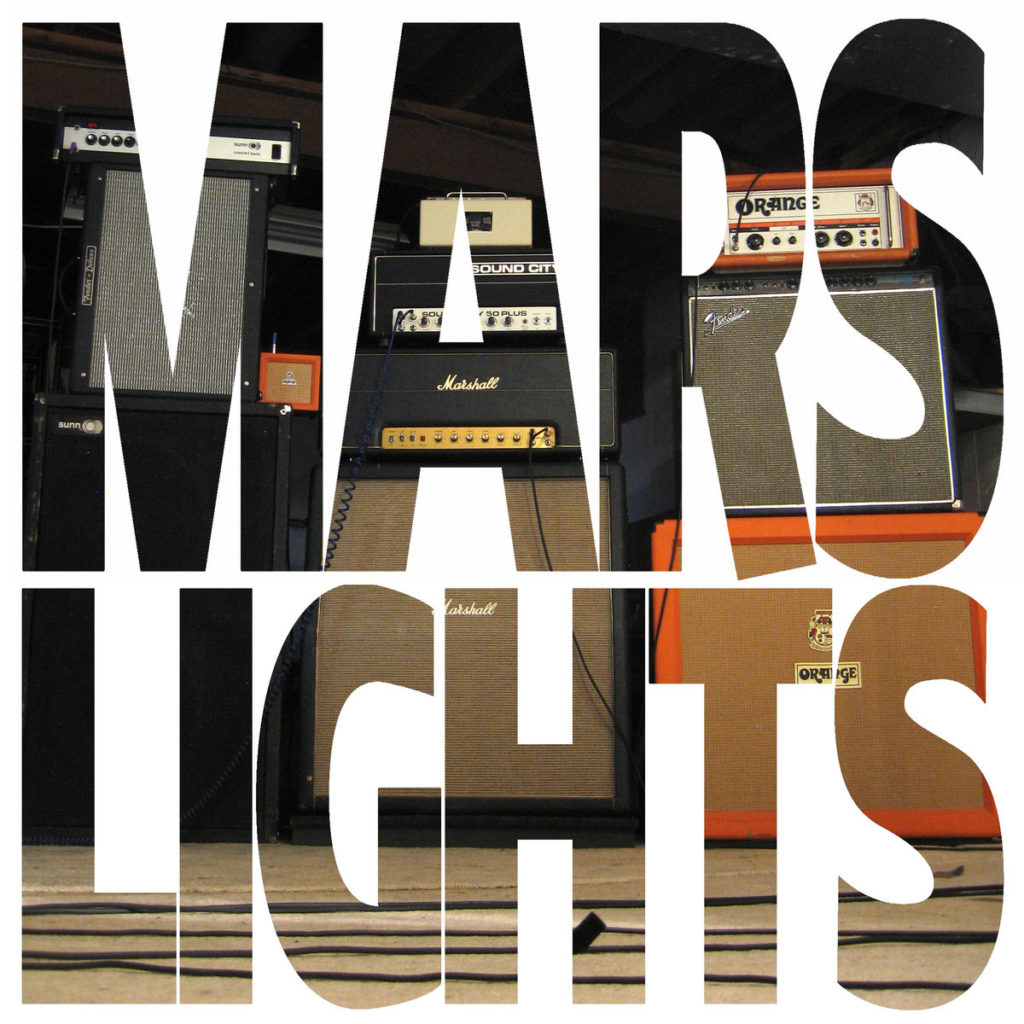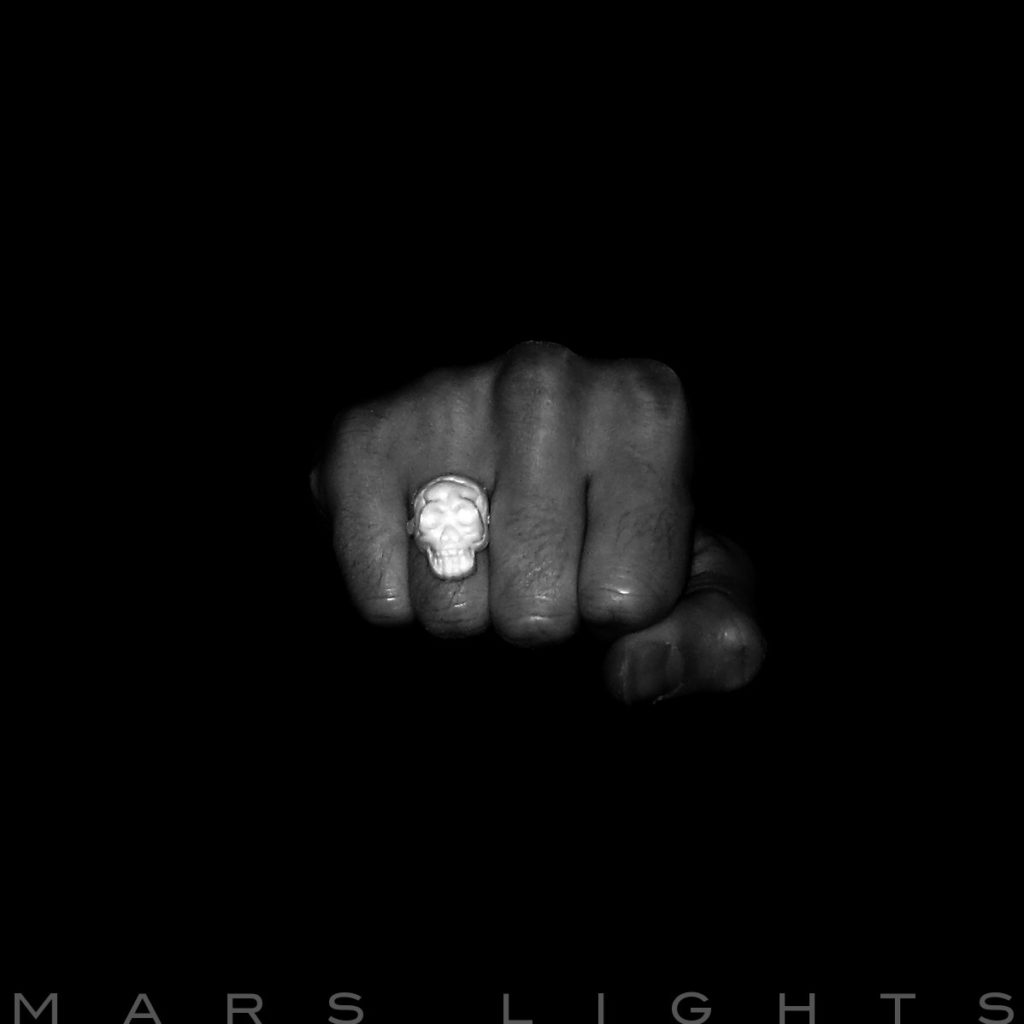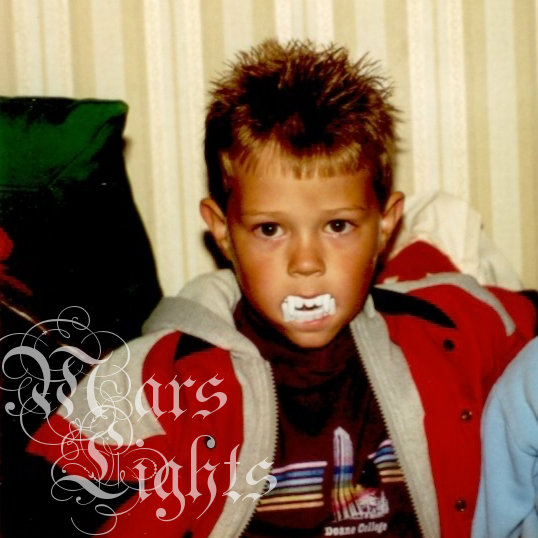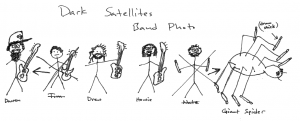For those of you who like such things, and/or find our vocals indecipherable, I posted the lyrics to Side 3 over at the Mars Lights site today. -h
-
Mars Lights Side 3 Lyrics
-
Ruff Stuff’s Secret
“Ruff Stuff,” from Mars Lights’ recent Side 3, hides something in its structure that you might not have noticed, but probably have felt as you’ve listened to it.
We’ve done a fair amount of messing with the blues before. (If you need a primer on the blues, check Wikipedia here; I’ll be referring to the shuffle blues variation, with V-IV-I-I as the last four bars.) “Straight Shots,” “Break This Dollar,” and “All Tied Up” are all essentially built around blues progressions.
In “Straight Shots,” you can hear the change from the I to the IV chord in the first verse right before I say “See the war down to the wire every time if they can,” and the V when the intro riff repeats at the end of the first verse and goes into the “I want a touch” part. “Break This Dollar” starts out with the I, hits the IV on the pre-chorus (the very first “Break this dollar…”), back to the I for the chorus, then the V-IV at the end of the chorus under “You got to get out!” “All Tied Up” is even bluesier; the first verse outlines what is almost a standard 12-bar format (some of the chords are held for slightly different lengths, but the progression is right there). The rest of the song is variations on that, with the long V leading into the end riff.
What’s different about “Ruff Stuff” is that the 12-bar progression is spread out over the entire length of the song; we only go through it once. Here are the chords to a slight variation on the standard 12-bar shuffle blues, a “quick four” with a IV chord in the second bar:
I – IV – I – I
IV – IV – I – I
V – IV – I – I
The whole intro and first verse correspond to just the first bar of this progression. The second bar, the IV, is the guitar break and chord change right after “I could stand your dark, stand your dark,” and the third and fourth bars of the progression are the second verse of “Ruff Stuff” (“Show me your toughest…”).
The next part, beginning with “It’s a bomb, you’re a test” matches bars five and six of the progression, the IV chord. In the original arrangement, there was a third verse to go with bars seven and eight of the blues, but we cut it, so there’s a deviation from the form there.
The V produces a noticeable change on the final “Sing!” of “Shadows sing, shadows sing!” and the break into the bridge of the song, which functions as a long riff on the V – IV section of the blues, before returning to the I (“Show me your ruff stuff!”).
I have a lot of fun twisting up the blues into something I imagine, for most people, is unrecognizable, but retains some of that amazingly timeless emotional push and sense of narrative and motion. When we’re writing parts to go along with a main riff, I’ll usually at least play around with something based around the IV or the V chord against the riff to see if it produces any sparks. Often, with a variation or an extra chord, it will, producing something with some musical roots along with my own aesthetic sense. If you write, try it! If you don’t write yet, a blues is a great place to start.
Of course, I don’t think any of it would be possible without high school jazz band. Thanks, Mr. P!
-
Return of the Matt
Mars Lights practiced with Matt this week for the first time in a long time, and it clicked immediately and felt awesome. Drew’s getting us a show at the Riot Room ASAP. Based on what we messed with, the set will likely include:
- Straight Shots
- Nukular
- Cold Burn
- White Flight
- All Tied Up
- Stars Above
- Black Roses II
- Stangray
The last two Drew and I have played at the Czar Bar and Replay shows last year. “Stars Above” is a riff that’s been around for a long time, but I just finished earlier this year during my big Mars Lights writing burst. “All The Time In The World” and “No Witnesses,” which we also did at the duo shows, are contenders.
My gear upgrades – Sunn amp and POG for the bass synth, GT500 and TimeFactor for guitar, and my Epi ES 355 guitar itself – really shone in rehearsal. I could hear myself better, and my tone stood up to Drew’s without needing to be overpoweringly loud.
Really fun. Made my week.
-
MR|Review – Snowden, Ladyfinger (ne), Palms, Aesop Rock, and Elder
What a beautiful surprise; seven years after Anti-Anti (which I still listen to regularly), Snowden returns in top form on No One In Control, hitting all the marks you might want based on their past work, and subtly expanding on it, too.






The band’s bread and butter is a backbeat-leaning, dark new-wave dance jam, coupled with stuttering kick/bass rhythms and a droning key or guitar line (see “Hiss,” or “Not Good Enough”). They’re so good at these, they don’t get old. No One In Control also twists and stretches this template successfully, building the title track up slowly over the course of seven minutes that could go on for twice that, integrating a cool, retro synth-stab sound with “The Beat Comes,” or dialing down Snowden’s usual burn to a simmer on “Don’t Really Know Me,” focusing rather than cutting its energy.
What can I say about the perfect “Anemone Arms?” Its simple, pure, eternal-but-counterintuitive theme? The beautifully understated arrangement? I invite you to give yourself over to it, especially if you’re in need of a moment of grace.
Every time I hear this record, I’m grateful Snowden made it.
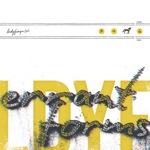





I’ve tried for a couple weeks not to be disappointed by Errant Forms, unsuccessfully. But, I love Ladyfinger. Their show at the Riot Room a few months ago, with mostly material from the new record, was great.
In the end, though, “Dark Horse” is the only good song (and it’s really good) that shows any growth from the band. “Blue Oyster” and “He Said She Said,” relegated to the last two tracks of the album, adequately invoke the old Ladyfinger; the rest of the set is toothless and meandering, two words I never expected to use about Ladyfinger’s music. Plus, “Meathead” is simply embarrassing in its unintentional irony. It’s a dumb, reductionist song trying to snark at dumb, reductionist stereotpyes.
My expectation that this album would be something other than what it is is something I’ve been wrestling with and trying to suppress before forming a solid opinion about Errant Forms. One angle on art that I like thinking about is sussing the artists’ intention, and the extent to which they accomplished it. Other than from “Dark Horse,” I haven’t gotten any sense of why Ladyfinger made this record. It feels mostly checked out of its own existence. The guitars are muted and indistinct, and the drums are fussy and tapped. I think my disappointment has more to do with the specific recording, not the band or the songs (since the live set was energetic and a little edgy). I’d gladly trade my copy of Errant Forms for a bootleg of the Riot Room show.
As a Ladyfinger listener, I needed to know what this album was. It’s good to know, but I hope the next one has some bite.
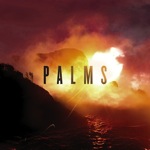





Palms’ self-titled debut is exactly what you’d expect from the press blurb; a Chino Moreno (Deftones)-fronted Isis side project. Ambient metal, or some such. In spite of that, I like it a lot and have it in heavy rotation, but that doesn’t mean it gets a strong recommendation by MR|Review.
Nothing here will reach up and grab you. Overdriven, heavily delayed arpeggios permutate around Chino’s moans and steady, sometimes angular, rhythms. If you listen closely, you’ll notice details changing from section to section. Otherwise, it mooshes all together. Rinse, repeat. “Patagonia” is my favorite example.
The first half of closer “Antarctic Handshake” indicates a direction forward, should the group ever convene again. It has a straightforward dream-pop feel that, maybe blended 50/50 with the languid space-rock of the rest of Palms (start with the metal section of “Mission Sunset,” guys) and written into complete songs, could be noteworthy on a wider scale than “interesting metal supergroup side project.” I hope Palms makes that record, but in the meantime I’ll dig revisiting this one periodically.






Aesop Rock’s Skelethon is over one year old, but I won’t relax about it until I’ve done everything I can think of to convince you to check it out.
It’s basically a perfectly-executed record, with Aesop Rock rapping over his own intricately-constructed beats; arrangements as tight as German engineering, every ounce of sound aimed squarely at making your head nod *so* *hard,* and it never lets up. I’m jealous, in an inspired way, of how thoroughly Rock executes his singular vision and practically forces his point of view on listeners.
Ahh, words don’t do it justice. You have to bang this once, and then tell me if you don’t feel it.






Elder’s Dead Roots Stirring – is it or is it not metal? – is so inviting and infectious it should spill over from stoner/doom/desert rock silos. If you love this shit like I do, you’re welcome. If you don’t (yet?) but have the slightest interest, here’s a gateway.
Hitting the sweet spot between straight blown-out blooze and alternately broken and augmented psychadelic riffing, Dead Roots Stirring is that kind of heavy that puts a smile on my face. There’s a joy in volume, a release in mutual submission, and egolessness in waves of fuzz.
Twelve-minute guitar jams aren’t for everyone; I get that. Just don’t assume they’re not for you until you’ve listened to a couple good ones.
MR|Review directs readers’ limited attention among works via ratings, and within works via prose, focusing on works where our opinion diverges from critical or popular consensus, or we have significant insight that compliments or challenges readers’ aesthetic experience. MR|Review totals to date: 




Must-hear! 2 




Recommended 13 




Good 9 




Fans only 10 




Skip this 3 




Owww! My ears! 0 -
Mars Lights Side 3 Free Download Codes
I’ve created some codes that will let you download Side 3 for free; leave a comment (including your email address, which will not be published) if you want one, and I’ll shoot a code over to you. -h
-
MARS LIGHTS | Sides
-
Mars Lights Side 3 Release
It’s out, and that brings about a nearly six-year chapter in our music to a close.
In late 2007, Matt and I were working on some new Five Star Crush demos, and found ourselves experimenting with some blown-out bluesy punk rock stuff during our down time. We wanted a third member, Cory told us Drew was in the area and re-introduced us, and what eventually became Mars Lights formed.
We started recording the Sides in February 2009, and have been working on them ever since. The last overdubs were done just a couple months ago; the Side 3 final mixes were made a week ago.
We’ve done other things, too. Drew and I are 85% of the way through tracking an album as a duo. He learned to play drums and record everything, turning Dark Satellites into an album, and then a full band. Matt joined In Back Of A Black Car, and is having some other post-rock adventures we hope to hear more from. I put a couple records out myself, mastered some others, and generally attempted to be a shark (keep moving), if a slow one.
As exciting as it is to share Side 3 with you, my strongest feeling right now is freedom. We learned so much through this project – about writing, recording, playing, gear, mixing, mastering, communicating, design, and more – and that’s already reflected in the LP that’s under way, and will be even more in the projects that follow after. It feels great to have reached this milestone, knowing some of the good stuff that’s on the road ahead (and not knowing some as well).
I hope you really enjoy Side 3, and all of the Sides. Rock out. Nod your head. Air guitar/drum. Be overcome. Or just press play and make dinner.
-h
-
Time is Now a Factor and Side 3
After all of my careful option-weighing and gear-lusting, I found a great deal on an Eventide Timefactor delay this week on Craigslist and just did it.
I started to dig into it last night, and already have fresh ideas for how to use it live. I’ll test it out on an old Mars Lights song for vocals this week.
The best thing about it is the dual delays, and the way they interact; they make the echoing so much more musical and unpredictable than single repeats.
Separately, Drew’s given me the final, final Side 3 mixes, and we took the cover photo a few nights ago, so that will be out in a week or two with four new songs, his mixing touch, probably our best production to date, and probably both our weirdest and catchiest material (separate songs :-) from the Sides.
-
Return to the Satellites
In case you haven’t seen Drew’s handiwork on FB already:
I think he has a future in portraiture.
But with that, comes news; we’re getting together with Jim (MR 1986, UUVVWWZ) in a couple weeks, in the hopes that he’ll replace the giant spider. I’m amped for that.
I’ll miss Spidey, though.
-
Keep Believing, Bro
Going on two years late, here’s Hear Nebraska’s review of The Sleepover’s Believe The Honesty, Bro. Long-time readers know that “Better late than never” is a fair summary of my approach to music, in spite of my best intentions.
We’re home from Ireland & the Isle of Man tomorrow.
-
Have You Checked Out MFR’s Site Map?
It’s here. It’s been there for a few months, but I haven’t said anything about it until now.
There are links to browse-able archives by author, category, and page, but the cool thing for me is the chronological list of posts (511 as of this one! I meant to note the crossing of the 500-post mark. Ack) going all the way back to our launch in fall of 2004. Even just a scan of the titles is pretty interesting:
- 2013 January – That was a pretty good Ladyfinger show at the Riot Room
- 2012 December – I still like the visceral/mysterious axis
- 2012 July – It’s been almost a year since we were drumming in the carriage house; hard to believe
- 2011 August – The Sleepover at ARC in Omaha…
- 2010 December – Took CA to see Jimmy Eat World for her birthday
- 2009 October – “There is Something and not nothing”
- skipping ahead… or back, really…
- 2007 February – The Shins in Lawrence, and the worst drive home ever
- 2006 May – First shows with Five Star Crush
- 2004-05 – All of the Minneapolis memories…
- 2004 September 21 – Liftoff!
What jumps out at you? What were you there for?
-
Wish List
Pedal voyeurism is nothing new around here, and it continues; after much searching, I think my delay narrowed down to a top contender.
Originally, I had been looking for analog delay, and was looking at the DMB Lunar Echo. (Coincidentally, also the name of my favorite, long-unavailable, standard Boulevard brew.) After Drew’s experience with a Keeley-modded AD-9, though (awesome on guitar, no good for vocal production or other studio trickery due to limited high frequencies), I started over, open to digital delay.
My criteria: good for vocal production (to duplicate what we do with Drew’s Fulltone TTE), ability to do both dirtier and cleaner echos, and bonus points for an infinite feedback switch. There’s a ton of great stuff out there, and if I was just getting a guitar delay, I’d probably go with the TC Electronic Flashback.
But for tape sound, short of the real thing (more than a grand just to play ball, and a bear to maintain), I’ve got my heart set on the Strymon El Capistan.
Beautiful sound, so many knobs, super-clean tape (still tape-y, though) to nearly wrecked, plus infinite feedback; it has to be. As soon as I need it for a project, I’m ready.

